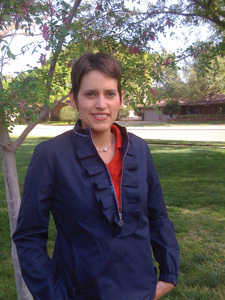5/15/2009
Young Minds, New Visions
Ellen C. Wells
Now in its fourth year, Green Profit’s Young Retailer Award recognizes the top members in the garden center industry under the age of 35. These three finalists have distinguished themselves. At 33, Anna Johnson has taken over the family business and is “doin’ it all!” Dannielle Strobel-Doyle has turned her passion into her mission and is creating new and in-demand garden products. And Lindsay Mennen never stops learning about gardening so she can help her customers be more successful.
Our 2009 Young Retailer Award winner will be chosen by a special panel of judges who will review the finalists’ nomination forms and assess their final essays. Thanks so much to our judges:
- Dr. Jennifer Dennis—Purdue University
- Jim Feeney—Feeney’s Nursery, and current president, Garden Centers of America
- Dan Mulhall—Mulhall’s Nursery & Garden Center and current president, ANLA retail division
- Chris Campbell—Campbell’s Nurseries & Garden Centers, and the 2008 Young Retailer Award winner
We’ll announce the winner at a special ceremony July 11 at the OFA Short Course in Columbus, Ohio, as well as in the September issue of Green Profit. Good luck to everyone! ‘
Our Sponsors
A big “Thank you!” to our award sponsors for helping our Young Retailer Award finalists break into the limelight:
Ball Horticultural Company & OFA—an Association of Floriculture Professionals
Essay QuestionWhat will you learn from this recession to help your garden center business run that much more cost-effectively? And how will you implement that?
 Lindsay Mennen
Lindsay Mennen
Age: 27
Title: Retail Manager
Operation: Pathways to Perennials, Kettleby, Ontario, Canada
When asked to write about how the recession has affected our business, a million things came to mind. Our biggest lesson came before the season began. We had the first two months pre-sold, then jobs started cancelling; our calendar emptied. Lesson learned: Take nothing for granted. We have opportunities. How can we run stronger, leaner, yet still profitable, while maintaining our immense passion for what we do? Here is our action plan.
We began with staffing. In previous years we hired too many people, thinking only the strong would survive. This year, only the strongest survived interviewing. We asked hard questions, got the best answers and only took on what we were sure we needed. We decided that during garden center hours, a core staff member would be there—the strongest and best would always be on hand to keep things running smoothly. We accented core staff only during peak times. This decreases staffing expenses approximately 30%.
We dedicated an entire day to company and customer service training. Staff were shown who we are, what we stand for, what our goals and expectations are and how we will achieve them. We taught them “TLC,” to “Think Like Customers,” a principal I learned at Garden Center University. We plan to follow-up with weekly “huddles” where staff will be trained on a series of plant combinations and products. Our focus will be on selling large collections, not individual plants. We showed staff each customer’s worth (average sale multiplied by the average number of visits per year) and emphasized that everyone through the door is an opportunity.
Our marketing strategy has also changed. For the first time in several years, we didn’t exhibit at the largest consumer show, which draws people from a huge demographic area. Instead, two of us were speakers and were paid to reach about 600 people. This gave an opportunity to share our knowledge and let people know about our company. Not having a booth saved six people a month’s work and over $10,000. We spent this month renovating a huge display area and converting it into a lifestyle design center. Customers will be able to wander through options and choose products and plants directly from our display. We approached suppliers who generously donated supplies to make the transformation possible.
We participated in one local show, which was attended by many in our immediate trade zone. The focus was to see every visitor as a potential lead. Information was taken for followup, and everyone who said they have always meant to visit was given the extra incentive of a gift coupon. We offered the show’s organizers to design the transition space (a concrete tunnel) between the two arenas. The show got a beautiful walkthrough, and our booth registration of $3,500 was waived.
Instead of placing monthly ads in local publications for $550, we did one black-and-white ad in spring. To get our name out, we wrote several timely press releases about the unique features of our business and sent these to large and local publications, enticing them to write about us at no charge. We designed a writer/speakers package to send out showing why they should hire us to write for their publications and speak to their groups. This is an opportunity to be paid for promoting our company and knowledge.
This spring we didn’t do a print newsletter for our mailing list. Instead we will use our e-mail database to stay in touch with customers biweekly, telling them what’s new, about upcoming events and why they should visit us. This has saved about $15,000 on printing and designing with opportunities to reach our customers more than once. It also allows us to get touchy feely with customers—running photo contests, sharing timely plant/maintenance tips and staff features.
Overall, despite the rough economic times, we have the opportunity to tighten our belts, learn new things and do what we do best—bring people and plants together!
 Anna Johnson
Anna Johnson
Age: 33
Title: Owner
Operation: Little Red Riding Hood Nursery, Lubbock, Texas
Resting on my laurels is not an option when you are raised in my family, and this year was no exception. Professionally, I have found it important to wear many hats in 2009. Considering our current economic situation, I feel it’s vital to diversify my efforts, do a little fancy organizing, spending, marketing and training.
Little Red’s customers have often asked if we would do more beyond landscape consultations and come install our creations. We have responded to many of these requests when we have felt that it wouldn’t water down our retail charge. This year we have responded more than ever. Our outside work has included everything from patios and landscapes to a large annual color installation and weekly maintenance agreement with a church. So far these additional funds have helped us not only with the economic downturn but also with the late, cold spring. This has actually brought many customers to the retail side that wouldn’t have otherwise come. Our plants have been our calling card; our work and the advertising on our crews’ T-shirts prompt people to come in and see what else we do. Our retail team hasn’t suffered as a result of the outside work, but they have been expected to work at a faster pace and learn more about our services. We actually plan on purchasing a new vehicle with all the revenue this approach has generated.
In addition to diversifying our services, we reorganized as well. During the cold, slow months this January and February, we spent a great deal of time going through our warehouse and all the boxes that had been stored upstairs and down. We brought out old treasures or hidden inventory and put it on the floor at regular or reduced prices (we even donated some, too). We were able to free up some of our “stored” cash flow as well as organize our warehouse space more efficiently so when the flush of inventory did come in, we could handle it more carefully.
Another step I have found very beneficial is to limit the amount of spending on credit. We have gone almost totally to a cash basis. I’ve used our 5,000-sq. ft. warehouse and have invested in hard goods. I can only foresee an inflationary period developing because of the massive amount of spending by this current administration and the devaluation of the dollar. So we’re stocking up!
Little Red has also turned its attention to what our vendors can do for us. We sought out a national company that we do business with and asked if they would be willing to teach a seminar on a busy spring weekend. Their expert presence brought in customers, allowed us to focus on our pursuits that day, and also opened the window for a great product knowledge seminar conducted the night before by that speaker for our staff. The use of Twitter was a free and easy way to create excitement about this event, as well. As a fun way to get out staff excited about these products we added anywhere from $0.50 to $1.00 spiffs for our employees every time they sold our specific tie-in products. Why not give a little pocket money to our hard working staff? They have enjoyed competing, and it is a direct way for me to see who is really “with me.”
The long-term effect of this economy is really a shift in our way of life and in doing business. We must be much more careful with funds and vigilant to our local customers’ needs. Ultimately, nothing is guaranteed, and as with all things in life we need to be flexible enough to seize opportunities when they present themselves. Otherwise someone else will. We really cannot sit back and wait to see what happens next. We are the captains and we should sail on even if our path seems uncharted. Our forefathers had it no differently, and they did great things
anyway.
 Dannielle Strobel-Doyle
Dannielle Strobel-Doyle
Age: 30
Title: Owner/Manager
Operation: Strobel’s Tree Farm Nursery & Greenhouse, Montpelier, Ohio
No matter how large or how small, we are all faced with the same effects from the economic downturn. Today’s companies can no longer rely on yesterday’s business strategies for survival. However, I take much comfort in knowing that recessions come and go, and I feel as though operations should run as if tough economic times are normal.
Efficient operations, process improvement and overall value are standards that I have put endless effort on improving. Continuing improvements will help guarantee an effective company that has the capability of competing in the horticulture industry. Difficult times can force us to look for new business avenues and ways to cut costs while we evaluate our financial situations. I found that adjusting procedures and not goals to reduce expenses to be relatively easy. I simply did an audit of all things essential and then stripped the rest.
Doing more with what you have rather than acquiring additional resources is also quite critical when trying to operate more cost effectively. But having said that, to remain in operation we cannot go beyond a certain level of our cost cutting efforts. Therefore, sales levels must be raised. One way that I have implemented this is by building stronger relationships with my customers through continued education. I look at this recession
as only an opportunity—an opportunity to gain market by developing and improving my knowledge and skills. My goal is to impress our customers with our product and plant knowledge. This will not only enhance our reputation as experts, it will also ensure that our customers return to us. After all, it’s the satisfied customers who will not only bring in more business, but also new customers.
As we aim for increased sales, we also aim for increased product quality. By propagating and growing 95% of the plant material that our greenhouse retails, I am able to provide a far superior product. This gives me the advantage of caring for our merchandise on a much deeper level. I’m also able to offer larger plants with a more full habit for a lower price, while remaining competitive. Our profit margins climb, as does our productivity.
When choosing inventory, it is also very important to pay close attention to trends. As the market rises and falls, there are going to be different consumer demands. Knowing of the recent increased interest in vegetable and herb gardening, I was able to manage the factors I have control of and improve our chances for a higher sales volume.
One of the most important things in running a production greenhouse is producing crops as energy efficiently as possible. Because the economy poses so many questions, now is the time to turn to energy-saving solutions. By experimenting with an alternative wood-burning resource and solar insulation, I was able to reduce heating costs by one-third. Optimizing the greenhouse environment to its fullest and learning more information on plant production cycles and how they respond to temperature and light is also extremely valuable.
As my company continues to grow and remain healthy, there is no doubt that the adjustments made are necessary to stay ahead during the current economic conditions. I’m extremely passionate about what I do. And if you’re passionate, you’re contagious. People want to work with you, buy from you, work for you and invest in your company. By being creative and having the drive and determination to do whatever it takes, I know I will continue to be an industry leader for many years to come.